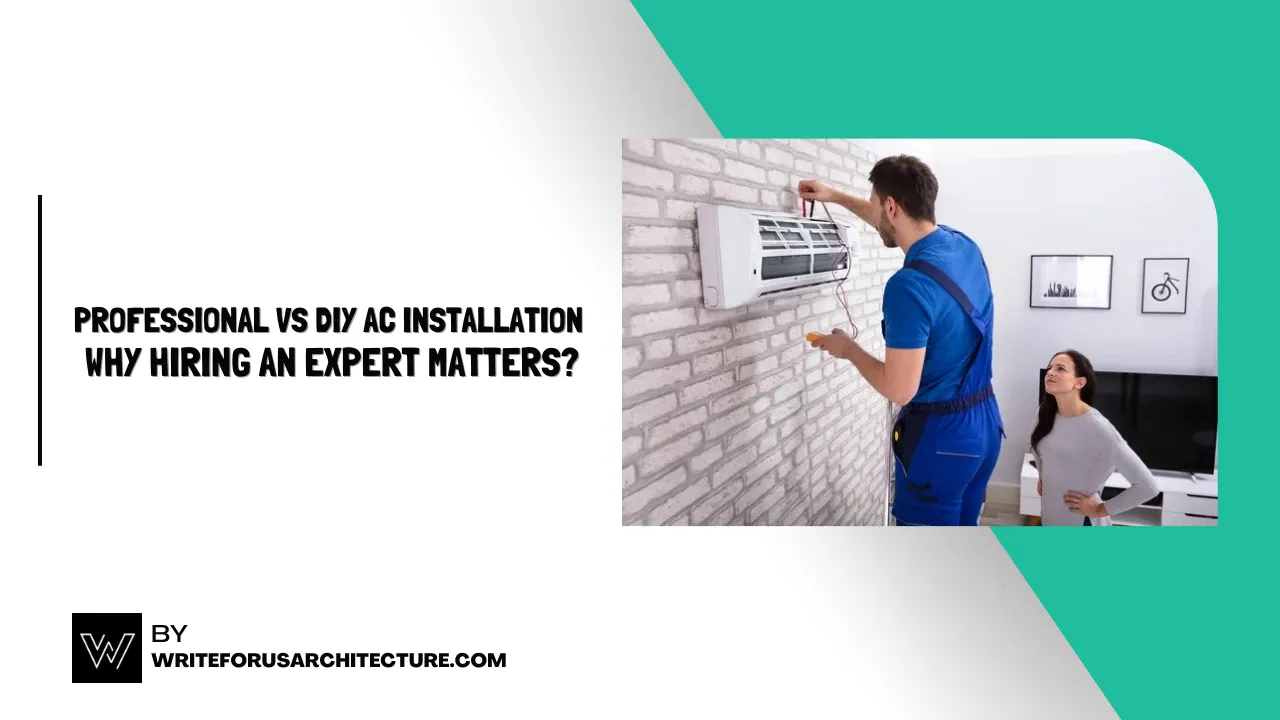When it comes to installing an air conditioning (AC) unit in your home or business, many homeowners face a dilemma: Should they attempt a do-it-yourself (DIY) installation or hire a professional HVAC expert? While the idea of saving money by doing it yourself may seem appealing, AC installation service is a complex process that requires the right skills, tools, and experience. In this article, we will explore why hiring a professional HVAC technician for AC installation is crucial and how it outweighs the risks and limitations of a DIY approach.
1. The Complexity of AC Installation
Understanding the Technicalities
AC installation involves far more than just plugging in a unit or attaching a few pipes. The process requires a detailed understanding of refrigeration cycles, electrical systems, and mechanical systems. If not done properly, you could face performance issues, inefficient energy consumption, and even costly repairs in the future. A professional HVAC technician has the necessary training and experience to handle all these complexities.
Key Technical Steps in AC Installation:
- Correct Sizing and Placement: Professionals use precise measurements to select the right size AC unit for your space. An improperly sized unit can lead to inefficiency and poor air quality.
- Refrigerant Handling: Professionals are trained to manage refrigerants, ensuring the right amount is used and that it is charged correctly without any leaks.
- Electrical Connections: Installing an AC system requires connecting the unit to your electrical system. Mistakes can result in electrical hazards and void warranties.
Knowledge of Local Codes and Regulations
AC installations must comply with local building codes, zoning regulations, and safety standards. A professional technician is well-versed in these codes and ensures your installation meets all legal requirements. Failing to comply can result in fines, the voiding of warranties, or the need for costly re-installations down the line.
Read More: The basics of HVAC installation
2. The Importance of Proper Sizing and Placement
A common mistake made in DIY AC installations is choosing an improperly sized unit. An AC unit that’s too large or too small for the space will result in inefficient cooling, increased energy bills, and a reduced lifespan for the system.
- Oversized Units: An oversized AC unit will cycle on and off frequently, leading to excessive wear and tear. This short-cycling reduces efficiency and increases energy consumption.
- Undersized Units: An undersized unit will struggle to cool the space, running constantly and overworking itself, which leads to faster breakdowns and increased repair costs.
Expert Tip: A professional HVAC technician performs a load calculation, considering factors like insulation, sunlight, and room size, to determine the ideal unit size for your space.
3. Safety Concerns
AC installation involves working with electrical components and refrigerants—both of which can be dangerous if not handled properly. A professional technician understands the safety protocols required to mitigate these risks.
- Electrical Hazards: If you’re not experienced with electrical wiring, you could risk electrocution, fire, or short-circuiting your AC system. Professional technicians are trained in safely handling electrical connections.
- Refrigerant Leaks: Incorrectly handling refrigerants can lead to hazardous leaks, which not only affect the environment but can also cause injuries or system failure. A certified technician has the right tools and training to handle refrigerants safely and ensure your system is leak-free.
4. Equipment and Tools Required for Installation
One of the biggest limitations of DIY AC installation is the lack of specialized tools. AC systems require precise equipment, such as refrigerant gauges, vacuum pumps, and piping benders. Most homeowners don’t have access to this expensive, professional-grade equipment, which can lead to mistakes and subpar installations.
Common Tools Used by HVAC Technicians:
- Refrigerant pressure gauges
- Leak detection equipment
- Vacuum pumps to evacuate air from the system
- Pipe benders and cutters
- Electrical testing equipment
Without these tools, your DIY installation could be incomplete or improperly done, leading to inefficiency and future repairs.
5. Time and Stress Savings
Installing an AC unit is not a quick task, especially if you’re unfamiliar with the process. What might seem like a simple weekend project could end up taking days or even weeks if complications arise. Furthermore, without the proper experience, mistakes are more likely to occur, which can delay the installation and increase the overall cost.
Professional HVAC technicians, on the other hand, are trained to complete installations efficiently and correctly the first time. They can also offer recommendations for maintenance and future repairs, saving you both time and money in the long run.
6. The Risk of Voiding Warranties
Many AC manufacturers require that installations be performed by certified professionals. If you attempt a DIY installation and something goes wrong, your warranty may be voided, leaving you without coverage for repairs or replacements. Hiring a licensed technician ensures that your warranty remains intact, protecting you from potential future costs.
7. Energy Efficiency and Long-Term Savings
An expert HVAC technician ensures that your AC system is installed with energy efficiency in mind. Proper installation includes ensuring that the unit is operating optimally, ducts are sealed correctly, and insulation is properly installed. All these factors contribute to long-term savings on your energy bills.
Improper installations, such as poorly sealed ducts or incorrect refrigerant levels, can lead to energy wastage, causing your AC system to work harder than necessary, which increases your energy consumption and drives up your utility bills.
8. The Potential for Expensive Repairs
While DIY installation might seem like a cost-effective option initially, the potential for expensive repairs later on is a significant downside. A poorly installed system can break down early or need costly repairs to fix issues caused by the improper installation. Additionally, if the system is installed incorrectly, it may not be covered by the manufacturer’s warranty, leaving you to foot the bill for repairs.
9. Hiring a Professional Ensures Peace of Mind
Finally, one of the biggest benefits of hiring a professional is peace of mind. You can rest assured that your AC system has been installed correctly, is safe to operate, and is covered by the appropriate warranties. A licensed HVAC technician will also be able to troubleshoot any issues that arise and offer you reliable customer service for future maintenance or repairs.
10. Conclusion
When comparing professional versus DIY AC installation, hiring an expert is the preferred option. While the temptation to save money upfront may be strong, the risks of DIY installation, including improper sizing, safety hazards, voided warranties, and long-term inefficiencies, significantly outweigh any initial savings. A professional HVAC technician brings not only the technical expertise and tools necessary for a successful installation but also peace of mind, knowing that your system is safe, efficient, and optimized for long-term performance.
If you’re planning to install a new AC unit, always choose a licensed and experienced HVAC professional. Their expertise ensures that the job is done right the first time, saving you time, money, and headaches in the future.
Also Read:

